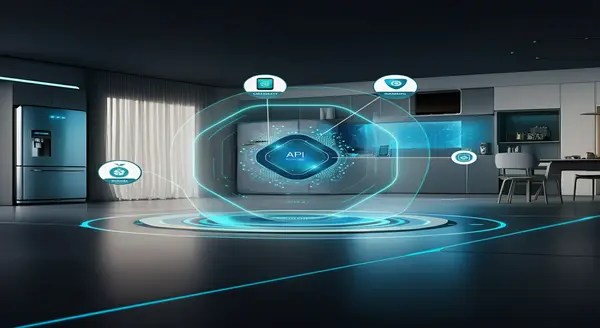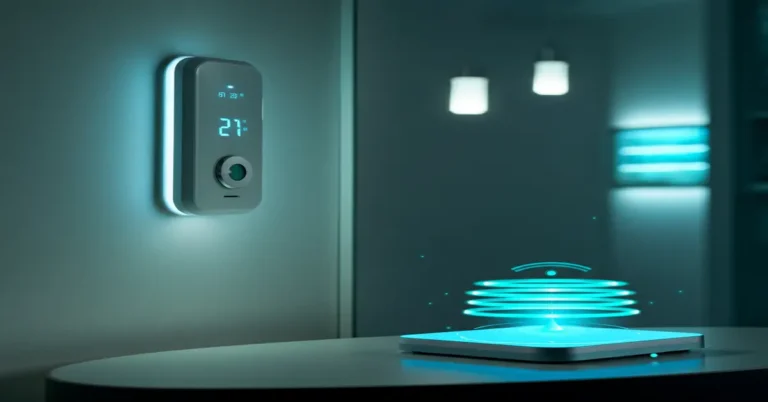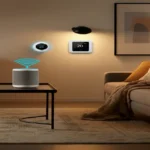Imagine walking into your home after a long day, and it welcomes you with soft lighting, perfectly adjusted temperature, and your favorite playlist. All this, without you lifting a finger! This delightful ease is possible thanks to AI in smart home tech, which is revolutionizing how we live while making our spaces energy-efficient, personalized, and incredibly smart.
But how exactly does AI enhance energy efficiency in smart homes? Let’s explore—and by the end of this article, you’ll have a complete understanding of the technology transforming our homes and helping us save energy. And if you’re contemplating upgrading your home, you might just feel confident about taking the leap into the world of smart technology for home.
What is Smart Home Technology?
It’s a network of connected devices integrated into your home to automate, monitor, and control elements such as lighting, temperature, security, and appliances. With smart home technology integration, you can achieve convenience, security, and energy optimization all at once.
This isn’t just about convenience anymore. Energy efficiency is one of the core benefits of home smart technologies, made possible through AI in smart homes.
Take my friend Jake’s experience, for instance. Jake, a father of two, loves the comfort of technology but was shocked by his rising electricity bill. After installing an AI-powered smart home automation controller, his energy consumption dropped significantly. Jake shared how his smart thermostat learned their energy usage patterns and turned off unnecessary systems during idle hours. It was a win for his wallet and the planet.
How Smart Technology for Homes Started It All
The idea of smart home of the future dates back to early programmable thermostats. However, it wasn’t until AI in smart home devices entered the scene that things truly started accelerating. Here’s why AI became a game-changer:
- Smart devices could now analyze data in real time.
- Predictive analytics allowed them to anticipate user behavior.
- Automation eliminated human intervention, saving time and effort.
Today, smart homes can do much more, including improving energy efficiency, adapting to your daily routines, and even integrating with renewable energy solutions.
The Role of AI in Smart Home Devices
AI’s Magic in Learning and Adaptation
One of the most exciting aspects of AI in smart homes is its ability to learn and adapt over time. When you install a smart home automation kit, it doesn’t just follow commands—it observes your habits to improve its service.
For example:
- AI-powered thermostats like Nest learn your preferred temperatures for different times of the day.
- Energy-hungry appliances like fridges or HVAC systems use predictive analytics to reduce power when they’re not needed.
- Smart lighting systems adjust brightness based on natural light availability, saving energy.
This learning capability ensures that energy is only consumed when necessary, making AI the backbone of energy efficiency in smart home technology for apartments and houses alike.
Real-Time Monitoring and Adjustments
A key application of AI is real-time energy monitoring through sensors and IoT devices. This is crucial for families, singles, and even renters interested in smart home automation kits.
Imagine having to manually monitor your electricity usage every hour. Sounds tedious, right? With AI, devices seamlessly monitor power consumption and suggest adjustments to reduce waste.
- AI-controlled smart grids or microgrids ensure power is balanced and optimized.
- Appliances can switch off automatically during peak times.
- Smart home automation controllers create schedules that sync appliances with moments of less expensive energy availability.
Energy Storage Optimization
For homes powered by renewable energy like solar, AI makes the process even more efficient. It calculates the best times to store and use energy, thereby extending battery lifespans and reducing costs.
This is particularly impactful for companies like Toll Brothers Smart Home Technologies, which integrate energy management with luxury living.
AI in Smart Security Systems
Besides energy, security systems paired with energy optimization offer dual benefits. AI-driven surveillance cameras ensure energy is spent only during unusual movements or at times when monitoring is critical. Now, that’s AI in smart home tech working smarter!
Pro Tip:
If you’re worried about high costs, start small with a scalable smart home automation kit. These kits that include AI-enabled devices like thermostats or motion sensors allow you to expand your setup over time.
Step-By-Step Guide to Using AI for Energy Efficiency
If you’re new to this, don’t worry! Here’s how you can get started:
1. Assess Your Current Energy Consumption
- Use a home energy audit tool to identify areas of wastage. Many apps available online can integrate directly with your energy meter.
2. Invest in the Right Devices
- Start with AI-powered devices like smart thermostats, smart lighting systems, or even a smart home automation controller.
3. Integrate for Seamless Interaction
- Opt for systems compatible with your entire home to allow diverse devices to communicate effectively. Companies like Google and Amazon offer comprehensive integration solutions.
4. Leverage Predictive Analytics
- Use appliances that learn from your routines. For example, AI-activated curtains on sun-facing windows can automatically lower during noon to reduce heat, minimizing AC usage.
5. Monitor Savings
- AI systems can also generate reports. Regularly reviewing these ensures you’re on track with your energy-saving goals.
By following these steps, you’ll see significant reductions in your energy bills and an improvement in comfort and sustainability.

Benefits of AI in Smart Home Systems
Integrating AI in smart homes offers numerous advantages when it comes to energy efficiency, security, and even convenience:
- Convenience
Devices work autonomously to make daily life easier. - Energy Savings
Cut down on unnecessary consumption and lower utility bills. - Enhanced Security
AI-powered surveillance systems offer 24/7 monitoring. - Personalization
Smart homes cater to individual needs by adjusting settings uniquely to each user. - Scanned Data for Optimization
AI evaluates historical and real-time data to optimize every watt of energy.
Why wouldn’t you want your home to be this smart and sustainable?

Challenges of AI in Smart Technology for Home
While promising, there are some challenges worth noting:
- Privacy concerns due to data sharing.
- Upfront costs for installation and devices.
- Regular maintenance for AI systems as they involve advanced technology.
Opting for certified brands with robust privacy systems can mitigate concerns while ensuring peace of mind.
Future Trends in Smart Homes
The future is bright for smart home technology integration. AI will integrate more seamlessly with IoT devices, further automating household activities. Toll Brothers Smart Home Technologies and innovations like decentralized energy grids are paving the way for energy-efficient connected homes.
Smart city planning will also rely heavily on AI in smart homes to ensure eco-friendly urban growth. Investing now means you’re a step closer to the smart home of the future.

FAQs
1. How does AI save energy in smart homes?
AI uses predictive analytics and real-time monitoring to optimize energy use, ensuring devices only consume power when necessary.
2. Can I install smart home devices in an apartment?
Absolutely! Many smart home technology for apartments solutions are space-efficient and work seamlessly in smaller residences.
3. Is smart home technology expensive?
The initial setup may seem pricey, but energy savings quickly offset costs. You can also start small with devices like smart plugs before upgrading.
4. How do I choose the best smart home automation controller?
Opt for one compatible with most smart devices in your home. Google Nest Hub and Amazon Echo Show are great options.
5. Is my data safe with AI smart home systems?
Leading brands prioritize security with encryption and privacy regulations. Always review the product’s data policy before purchasing.
AI isn’t just changing homes—it’s redefining lives. The benefits of AI in smart homes, from energy efficiency to convenience, make this an investment worth considering. Transform your home into the smart home of the future today!



